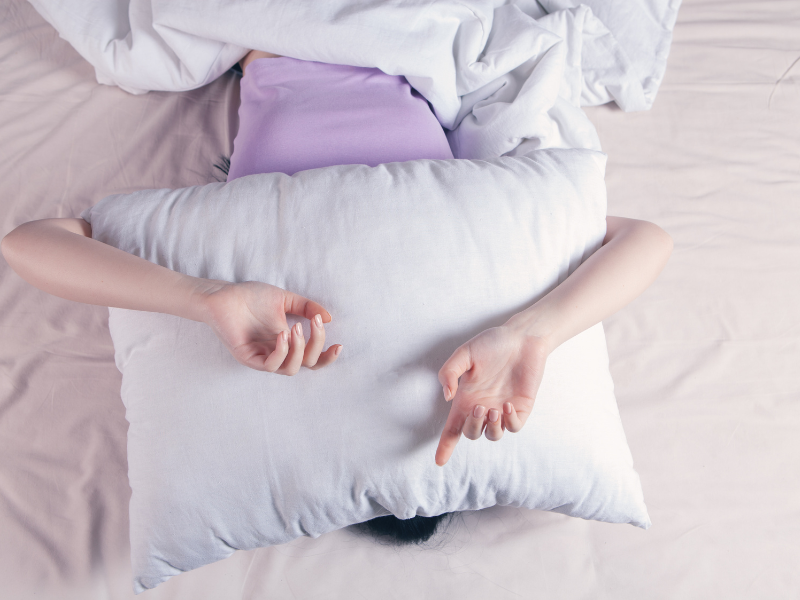
Be it pressure at work, annoying neighbours, energetic kids, the whims of other people, monotony or bad food: There are many factors that can affect sleep and take away the necessary rest we require during the night. Sometimes a lack of sleep is only temporary and is forgotten easily once we compensate for it. Problems are quick to follow once we are in the downwards spiral of insomnia and chronically suffer from lack of sleep.
As you already may know, a full-fledged sleep is your best friend, as it not only affects the overall health but also how effective you are during the day. The good news is sleep problems can easily be managed, if you follow a couple of rules.
Bulgaria does not have data on this subject, however the percentage of people suffering from lack of sleep is between 20 and 25, according to Eurostat. In practical terms this means almost every fourth person in Europe does not lead a healthy life because of sleep problems.
Specialists also add that women often experience more restless nights, as they go to bed accompanied by the worries of daily life, while men can more easily ignore them. If you observe a lack of sleep pattern on more than three days weekly over the course of a month, the best countermeasure is to visit your doctor.
Of course, this remains a last desperate measure and can be avoided by various healthy habits you can apply for you and your sleep, prior to needing a specialist.
THE BEDROOM – OUR FORTRESS
We can easily paraphrase and shift the priority in our homes away from the living room or the kitchen and onto the room we seek out to rest every night.
To ensure full comfort while sleeping it is very important to create a time regiment of falling asleep and waking up and strictly following it. Regardless of your tiredness, the goal is to always head to bed at roughly the same time. This helps our bodies adapt to a unified model and to ultimately begin “dictating’’ on its own when to head to bed and when to wake up.
Secondly, the mattress and its frame play an important role. They must support the vertebra and be completely compatible with your individual size and weight, including the preferred position of sleep. This is the reason specialists recommend buying two mattrasses to couples sleeping in one bed, as this not only assists individual comfort while sleeping, but also eliminates any risk of waking each other up by tossing or turning during the night.
Naturally, the pillow and bed sheets are not to be underestimated as well. Comfort and natural materials aid relaxation and positively affect sleep. Furthermore, use dark hangers or blinds to avoid getting woken up by the sunlight before the body has had the chance to fully rest.
EVENING RITUAL FOR A GOOD NIGHT’S SLEEP
Have you ever heard of the fact that a calming activity before going to bed can positively affect the quality of sleep. Reading an interesting book, listening to music, painting or engaging in some other favourite hobby (individually or with the family) can also help forget the worries of daily life and shift gears. If you successfully turn that into an own ritual before bed, you are guaranteed to experience blissful sleep until the morning hours.
To truly ensure a good quality of sleep, here are a couple of unhealthy factors you should give up, even if they should fall into the category of your favourite activities.
- Forget electronic devices: We know how pleasant surfing the internet or social media in bed can be, but phones and tablets cannot be a part of your evening ritual. They overstimulate the nervous system and present the body with numerous information and impressions, all of which do not help falling asleep. Hence do specialists advise against using such devices for at least an hour before going to bed, thereby not hindering the process of falling asleep.
- No television, emails or YouTube. You are mistaken n thinking that a romantic comedy or that favourite episode of the latest series you’ve been watching would relax and prepare you for sleep. On the contrary, you might even need more time to adequately process the resulting emotions. Checking up on work emails is an equally poor idea and chatting with friends will just reduce your time for resting.
- Be wary of night-time eating. It is an all-known that sleep on a full stomach is not good, so avoid going to bed immediately after eating. The “gold standard” is to leave two to four hours for digestion. If this becomes impossible due to working late or other tasks, distribute your meals during the day and avoid eating too much at once.
- Alcohol is not a tranquiliser. Sure, one or two glasses of wine may relax you and help you fall asleep, but they will do little to aid the brain in regenerating during the night. Alcohol induced sleep is not healthy, because it hinders the phases of deep REM sleep, thereby inhibiting the body’s ability to regenerate.
DON’T FIXATE ON TIME
Just how important is it to sleep exactly 8 hours every night? Should you worry if you fail to rest for more than 7 hours?
Specialists provide categorical answers to these two questions – the duration of sleep is only a problem if it fails to ensure a sufficient regeneration of the brain and body. If you feel fresh in the morning, full of energy and rested, it doesn’t matter how many hours of sleep you managed to get. There are people that feel wonderful after only 7 hours of sleep and those who need at least 9. Older adults, for example, wake up several times during the night and therefore they often compensate with an afternoon nap. On the other side, while they are growing, babies and small children need at least a couple of sleep “’portions’’ during the day.
The truth is, we cannot control our sleep however we may see fit, as it is directly dependent on our genetic predispositions. They determine whether we are the type ‘’owl’’, which is awake at night and sleeps until noon or the type ‘’ lark’’, which wakes up early but doesn’t manage to finish the evening movies. Of course, an ‘’owl’’ can hardly go against its nature by standing up at 6 o’clock for work over a long period of time and a ‘’lark’’ would not take late nights shifts or make plans for that time. All of this varies with age and if we know what type we are, we can more easily manage the arising sleep problems.
More pieces of advice:
1. Soft socks for better sleep. People who sleep with socks in bed fall asleep faster, according to experts. Soft and fuzzy textiles create comfort, relax and eliminate stress.
2. In the bed between 22:00 and 23:00 o’clock. This is the perfect time for falling asleep for a healthy heart, according to a study of the German university Exeter from 2021
3. Sex before bedtime. Don’t underestimate lovemaking, as it increases the supply of the hormone progesterone. As we know, progesterone has a relaxing effect and allows women to sleep better.
4. Daily activities. Doing sports is healthy and there is no question about its benefits. If you cannot train regularly, try walking to work or take a stroll in the park for at least an hour a day.
IF EVERYTHING ELSE FAILS …
Then you can aid your own sleep hormone with additional intake of melatonin. Usually available as a food supplement in pharmacies and drug stores, the choice of form is abundant. The standard dosage is one cap a day, but you must be patient. The effect becomes only evident after one or two weeks, when the amount of melatonin stored in our bodies reaches a sufficient threshold.
- NOVANIGHT triple effect x 16 caps
- NATURPRODUKT healthy sleep with melatonin and passionflower.
- Jamieson melatonin 10 mg with prolonged release
For people who don’t like pills, melatonin is also available as drops, fruit gums and chewing gum. The current real market hit are sprays, which are applied under the tongue, work immediately and can induce sleep in less than 5 minutes. They are therefore used by people, who travel often and have problems adapting to different time zones.
- Jamieson Sleep melatonin spray with mint flavour
- NATURPHARMA SOMNI EX spray for insomnia
- HERBAMEDICA MELATONIN LIQUID
- WEBBER NATURALS GUMMIES MELATONIN 5mg in aiding normal sleep
- SALUDBOX MORPHEO for faster falling asleep
Apart from melatonin in pure form, you can also find a wide variety of herbs and natural products aiding sleep. These are teas made from chamomile, mint, lavender, St. John's wort, lemon balm and others, as well as the "gold standard" for nervousness and sleep problems - mint, hawthorn and valerian. Almost every product from this category is enriched with vitamins and minerals, hence their healthy and stress reducing effects.
DON’T REACH FOR THE SLEEPING PILLS:
Sleeping pills are double edged swords, as they can have undesired side effects and can lead to addiction. Furthermore, they only tackle the symptoms and not the underlying cause of insomnia. This is the reason specialists view them only as a temporary measure in combating sleep problems.
A large quantity of the active ingredients in sleep medicine is only allowed for short term use (up to 4 weeks), while the dosage varies individually. The beginning and the end of the therapy must be planned very carefully, as to not stress the body and cause dependence. The therapy starts slow and gradual, while adapting the dose and ending the same way – step by step. Abruptly ceasing the use of medications can cause a series of unwanted reactions and the reappearance of acute insomnia.
Usually, the pills are well digestible but, in some cases, can cause strong tiredness and or vertigo on the following day, headaches and digestive problems. Overdosing on the other hand can lead to a serious poisoning, including life threatening conditions. Consulting your doctor is necessary, as factors such as the consumption of other medication must be also considered.





